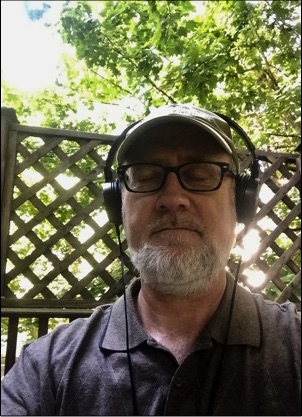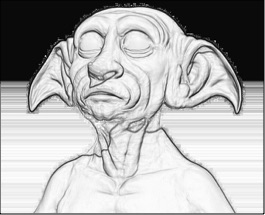Your brain receives from your deeper self, the guidance and resources needed to give him your best path forward for any situation, challenge, or goal.
Research (Wilson 2007) suggests that your deeper, non-conscious self processes about 11 million bits of data a second.
And every four seconds it pulls back from a spotlight focus on what’s going on, and turns on the floodlight to look at the bigger picture. (Fiebelkorn 2018)
For every option you consider, at the level of your deeper self, you work out your best path forward. (Gallivan 2017)
But it is your brain who makes the decisions. It filters the guidance from your deeper self to hand pick what supports its daydream about the world. (Shadlin 2017)
And whenever it manages to find information that supports that limited view, it rewards itself with a shot of dopamine - the feel good neurotransmitter. (Gorman 2016)
That is what is holding you back from getting your optimal performances and the most fulfilling outcomes for what’s of interest to you in your life.
You have all the inner resourses you need to achieve a value fulfilling outcome for any situation, challenge, or goal you have in your personal or work life.
But your brain is too distracted by the self-created shadows of hovering pterodactyls that it sees!
When you coach him to pause, and notice what he’s doing, and what’s going on, without resistance, (which is the essence of focusing mindfully) he automatically channels the very resources you need to live your best life!

The amount of research into how your brain and mindfulness work, has exploded over the last few years.
But that’s all academic stuff.
The trick is to figure out how to make use of what we are discovering so that you get get your optimal performance and the most fulfilling outcomes for anthing you’re passionate about.
Now, I know it feels like you are consciously making decisions, but research (Haynes 2008) suggests that your brain has already made that decision for you about ten seconds before you consciously know about it.
And the stress and anxiety you feel during your day? - that’s not you, that’s your brain.
He’s got what psychologist call a ‘negativity bias’ (Cavioppo 2014) especially when he doesn’t know what’s going to happen (Petro 2018).
And he’s always talking to you, which is okay, except he mostly talks about how horrible the things that have happened to you, or that are going to happen to you, are.
Which isn’t that helpful, especially because research (Leahy 2006) suggests that 85% of what your brain fears will never happen.
To which your brain probably just asked you, “What about the 15% that does happen?”
Well, the same research suggests, that you are usually more capable than your overprotective brain gave you credit for, and can handle those situations.
But why is your brain like this?
Your brain’s prime function is to protect your sense of Self.
A large part of that consists of him learning about the world so that he can predict what may happen and protect you from perceived threats.
He does this by constructing an inner model of what the ‘World’ is like, and who you are.
Research (Ehinger 2017) suggests that your brain mindlessly defers to this ‘daydream’ version even when it contradicts reality.
Instead of focusing on what’s going on, research (Killingsworth 2010) found that almost half the time your brain is daydreaming about something else.
Your brain wants to be your best possible ‘personal assistant’ and help you feel happy, but he’s often just terribly overprotective and misguided.
So what can you do to help your brain help you better?
Research (Goyal 2014) suggests that when you practice mindfulness, your brain daydreams less, and you become less stressed, more productive, more compassionate, happier and healthier.
Bsync Mindfulness, unlike standard or traditional forms, is purpose-driven.
You are purposely coaching your brain to notice how things ‘flow’ for you when he chooses to focus mindfully on what you are passionate about.
And you do that because when your brain focuses mindfully on something he automatically channels and acts on the better informed, reality-based, guidance of your deeper, non-conscious self.
Copyright 2019 by Peter M Fellows. All Rights Reserved.
Peter M Fellows
BSYNC - THE NEW AMERICAN MINDFULNESS
“Mindfulness focused upon what you are passionate about!”
Text me at: 914 - 275 - 8238
Email me at: petermfellows@gmail.com
You are the Coach. Meet your
new mindfulness student,
your brain.
Coach Your Brain


You have all the inner resources you need at a deeper level of yourself.
All you have to do is to help your brain notice when he is daydreaming and choose to focus mindfully instead.
Your brain avatar
With Bsync Mindfulness
you coach an avatar
representing your brain
to practice mindfulness
There is a ton of research out there on positive psychology, cognitive neuroscience, and mindfulness. And there is more coming every day.
Since I’m not limited by being a specialist, I was (and I am) able to look at all the pieces of the puzzle.
So I developed the Bsync Mindfulness process from cutting edge research such as the data on third person self talk (Kross 2014), on interrogatory self talk (Senay 2017), on how we find it easier to feel compassion for others than for ourselves (Neff 2015), on the power of self-distancing from our thoughts, rather than identifying with them (Kross 2005), on the focusing value of using names rather than labels (Lupyan 2011) and more.
So, to make it easier to train your brain, you’ll imagine a character that will represent it.
You know “Dobby,” the house elf in the Harry Potter series? (If you don’t, you can just google him.)
Well his characteristics are very similar to how your brain is working. (See my article “Why Your Brain Is Just Like Dobby - Harry Potter’s House Elf”)
For the purposes of training, you’ll name him and imagine that you are coaching him.
You’ll find this much more effective than just imagining talking to the organ that is your brain.
And I'll be online to coach you as you need it.

Your brain avatar practicing mindfulness


